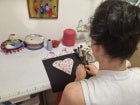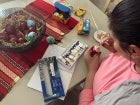Breadcrumb
Stories
Topic
- Show all (1287)
- Primary prevention (-) (25)
- Capacity development (-) (2)
- Disaster risk reduction (-) (2)
- Ending violence against women and girls (72)
- Gender equality and women’s empowerment (45)
- Anti-violence interventions (42)
- Gender discrimination (38)
- Gender equality and inequality (38)
- Domestic violence/interpersonal violence (36)
- Access to justice and legal protection (34)
- Legal assistance (30)
- Laws, legislation (27)
- Gender-responsive budgeting (24)
- Sexual harassment (24)
- Feminicide/femicide (23)
- Service delivery (23)
- Economic empowerment (22)
- Rape/sexual assault (21)
- Shelters (21)
- Employment (20)
- Rural women (19)
- Entrepreneurship (18)
- Decision-making (16)
- Youth (16)
- Gender power relations (15)
- Women’s rights (15)
- COVID-19 (14)
- Financing for gender equality (13)
- Gender mainstreaming (13)
- Civil society (12)
- Gender, culture and society (12)
- Men and boys (masculinity) (12)
- Political empowerment (12)
- Access to basic services (11)
- Adolescents (11)
- Beijing Platform for Action (11)
- Businesses and foundations (11)
- Girls (11)
- Human rights (11)
- UNiTE campaign (11)
- Civil society participation (10)
- Peace and security (10)
- Safe Cities and Safe Public Spaces (10)
- Training (10)
- Women with disabilities (10)
- Convention on the Elimination of All Forms of Discrimination against Women (CEDAW) (9)
- Financial resources (9)
- Gender stereotypes (9)
- Information and communications technology (ICT) (9)
- Leadership and political participation (9)
- National planning (9)
- Partnerships (9)
- Governance (8)
- Innovation and technology (8)
- Institutional mechanisms (8)
- Peacebuilding (8)
- Social protection (8)
- Women farmers (8)
- Citizen engagement (7)
- Gender statistics (7)
- Generation Equality (7)
- Government contributors (7)
- Productive resources (7)
- Religion (7)
- Science and technology for development (7)
- Sports (7)
- Trafficking/sexual exploitation (7)
- Women’s movements (7)
- 2030 Agenda for Sustainable Development (6)
- Child marriage (6)
- Communications and media (6)
- Electoral systems and processes (6)
- Lesbian, gay, bisexual, transgender, intersex (LGBT) rights (6)
- Markets (6)
- Political violence (6)
- Sex-disaggregated data (6)
- Sustainable Development Goals (SDGs) (6)
- Traditional media (6)
- Unpaid work (6)
- Accountability (5)
- Gender data production and collection (5)
- Governance and national planning (5)
- New media (5)
- Rural development (5)
- Constitutions and legal reform (4)
- Gender data gaps (4)
- Gender data use and accessibility (4)
- Gender wage gap (4)
- Health (4)
- Intergovernmental processes (4)
- Land and property (4)
- Media leadership (4)
- Poverty (4)
- Public administration (4)
- Rule of law (4)
- Schooling (4)
- Accountability in the UN system (3)
- Climate change (3)
- Crisis response and recovery (3)
- Education (3)
- Environmental protection (3)
- Gender equality indicators (3)
- Health care services (3)
- Inheritance rights (3)
- Living conditions (3)
- National mechanisms (3)
- National statistical systems (3)
- Parliamentary development (3)
- UN Security Council resolution 1325 (3)
- UN system coordination (3)
- Coordination, knowledge management (2)
- Food security (2)
- Fundamental freedoms (2)
- Fund for Gender Equality (2)
- Harmful practices (2)
- Humanitarian action (2)
- Human rights–based approach (2)
- Macroeconomic policies (2)
- Monitoring and evaluation (2)
- Planning and monitoring (2)
- Sexual and reproductive health and rights (2)
- UN Security Council resolutions (2)
- Urban development (2)
- Åsa Regnér, Deputy Executive Director for Policy, Programme, Civil Society and Intergovernmental Support (1)
- Children’s rights (1)
- Commission on the Status of Women (1)
- Executive Director (1)
- Financial and economic crisis (1)
- Green economy (1)
- Literacy (1)
- Local development (1)
- Maternal health (1)
- Migration (1)
- Monitoring, evaluation and reporting (1)
- Peace processes (1)
- Public sector reform (1)
- Sexuality (1)
- Temporary special measures, affirmative action (1)
- UN Trust Fund to End Violence against Women (1)
Region
Country
1 - 20 of 28 Results
Pagination
Date:
With nearly 30 years of reporting on crime, justice, and social issues, journalist Anila Hoxha is a leading voice for women silenced by violence in Albania. As a long-time member of the UN Women Media Forum, she sheds light on femicide, economic injustice, and gender inequality through her investigations, podcasts, and advocacy.
Date:
UN Women Albania, in partnership with the Government, civil society, international partners, and UN agencies, marked this year’s 16 Days of Activism Against GBV under the theme #NoExcuse – UNiTE to End Violence Against Women and Girls. Activities included awareness campaigns, exhibitions, an award ceremony, youth initiatives, and private sector collaborations.
Date:
People's Advocate along with the support of UN Women released a report on the killings of women and girls, as well as femicide, revealing that 32 women were killed between 2021-2023.
Date:
Women and girls with disabilities in Albania are not only faced with physical and structural barriers but also with the often less visible yet pervasive threat of gender-based violence. On the International Day of Persons with Disabilities, they shared their stories of resilience, despite numerous challenges.
Date:
United Nations Agencies in Albania, alongside government institutions, civil society, and citizens, kick off the 16 days of activism against gender-based violence under the theme #NoExcuse – Unite to End Violence Against Women and Girls.
Date:
Monika Kocaqi has dedicated twenty-five years to preventing gender-based violence (GBV) in Albania and her work is far from over. She has led groundbreaking initiatives, including the early implementation of the Domestic Violence Protection Law, overcoming skepticism and driving systemic change. Monika Kocaqi supported the establishment for the first time of the Coordinated Referral Mechanisms and enhanced the legal knowledge of professionals. She has been at the forefront of initiatives like gender-responsive budgeting to secure vital services for survivors of gender-based violence. Her extensive work includes authoring over forty training manuals, strategies, and research studies on GBV and gender mainstreaming in Albania and beyond.
Date:
Through the UN Joint Programme and UN Women’s intervention, nearly 500 women and children received support with healthcare, legal aid, counseling, vocational training, and housing, resulting in 69 women securing employment and over 250 families receiving rental assistance in Albania.
Date:
UN agencies, national and international partners, visit North Albania to assess progress of the UN Joint Programme on Ending Violence Against Women.
Date:
The week leading to International Women’s Day buzzed with various activities, ranging from a youth-led campaign addressing gender discrimination in the workplace to the launch of Albania's Femicide Watch. An interesting panel featuring only men offered intimate insights into their experiences with patriarchy, feminism, and women’s rights. These events, held in collaboration with governmental bodies, UN agencies, private sectors, and academia, underscored a collective effort to tackle gender inequality from various angles.
Date:
Over the past decades, women and girls around the world have demolished barriers, dismantled stereotypes and driven progress towards more just and equal societies. Women’s rights were recognised as fundamental and universal human rights.
Date:
On International Women’s Day, the People’s Advocate in cooperation with UN Women launched the ‘Femicide Watch’. This first of its kind initiative will collect and analyze data at the national level to promote more effective policies and mechanisms to prevent gender-based killings of women.
Date:
How a women’s rights organization and the National Employment and Skills Agency in Albania are joining forces to support women survivors of violence integrate in the job market.
Date:
They are asking for increased long-term, sustainable investments from government, private sector, foundations, and other donors to prevent violence against women and girls.
Date:
The UN Resident Coordinator’s Office and UN Women Albania co-organized an online training on the Gender Equality Marker (GEM) and the Human Rights Marker (HRM). The overall aim of the training was to ensure that the GEM and HR Marker scoring will be accurate for the upcoming Joint Work Planning cycle, which will cover the 2024-2025 period. The training was also an important step for ensuring the accuracy of markers is instrumental for adequately score UNCT SWAP Indicator 6.1, which verifies whether adequate resources for gender mainstreaming are allocated and tracked.
Date:
In a dedicated effort to promote gender equality and eliminate all forms of discrimination against women, Albania is preparing for its fifth report to the Committee on the Elimination of All Forms of Discrimination Against Women (CEDAW), scheduled for October 18, 2023.
Date:
After six years of dedicated work, the UN Women regional programme Ending Violence Against Women and Girls in the Western Balkans and Turkyie “Implementing Norms, Changing Minds” comes to a close. Civil society organizations, government representatives and partners met to take stock of achievements, challenges, and the way forward.
Date:
In the last two years, thanks to support from the European Union-funded regional programme on ending violence against women “Implementing Norms, Changing Minds,” more than 3,000 women survivors have used the helpline for information, referrals and reporting – 900 of whom further obtained free legal aid and psychosocial counselling as well as referrals to more specialized support services.
Date:
Supported by a small grant from the UN Trust Fund, the Center "Shelter Edlira Haxhiymeri", in close partnership with the Streha Center for LBT women survivors of domestic violence, runs a project to end violence against women and girls in four remote areas of Albania.
Date:
Interview with Michele Ribotta, Head of the UN Gender Group and UN Women Representative in Albania
Date:
Aferdita Kote’s* old Nokia phone had only one contact: that of her husband of 10 years. He called her constantly to know her whereabouts. But she did not tell him when she got a new smartphone equipped with a mobile application (Bright Sky) to report violence.
1 - 20 of 28 Results



















